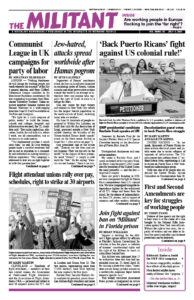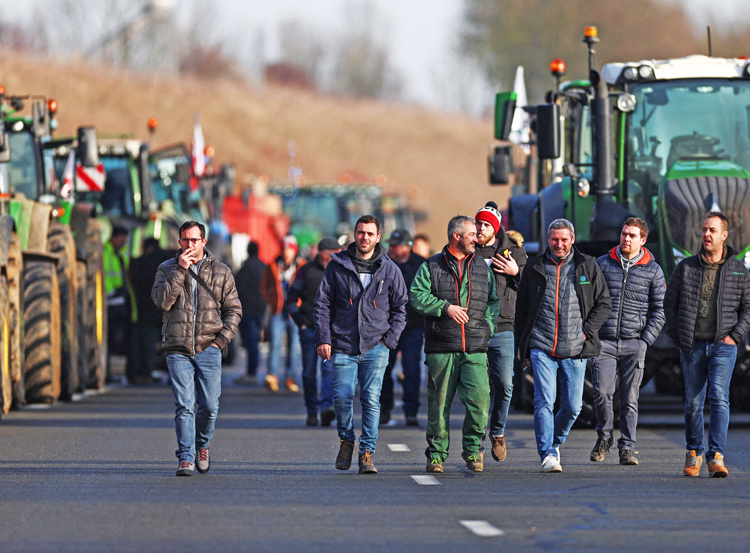Elections to the European Parliament June 6-9 saw heavy losses for governing capitalist parties that tens of millions of working people hold responsible for the worsening conditions they confront. The results reflect these crisis conditions, but they’re presented in the liberal press worldwide as a shift of the working classes to the “far right.”
No independent working-class party presenting an alternative to all the capitalist parties contested the elections. The vote took place after years of rising prices, growing instability and climate taxes on farmers amid the rearming of capitalist powers across the continent in preparation for more bloody conflicts in the wake of Moscow’s attempt to conquer Ukraine.
“From France to America, the far right is on the march,” the Financial Times headlined June 17. “Voters have grown more concentrated on nationalism and identity, often tied to migration,” complained New York Times columnist Matina Stevis-Gridneff. Liberal commentators view working people in Europe through the same lens that they look at workers in the U.S., as the source of bigotry and reaction.
People in 27 countries voted for representatives to the 720-seat European Parliament. The center-right European People’s Party, headed by European Commission President Ursula von der Leyen, retained its position as the largest bloc. On the middle-class left, the Greens and Social Democrats lost seats, while the liberal Renew group also suffered losses. Parties that registered gains are frequently described as “far right,” but they have actually shifted toward the center of capitalist politics.
After 18 months in government, Italian Prime Minister Giorgia Meloni’s party, Brothers of Italy, more than doubled its seats. In contrast, her junior coalition partner, the more rightist Lega led by Matteo Salvini, fell to 8%, less than a quarter of its 2019 vote tally.
Unlike Lega, Meloni favors Italy remaining in the EU. She supports Ukraine’s fight for its sovereignty and Israel’s war to defeat Hamas. But the liberal press still insists she is “far right.”
While more right-wing parties gained in Germany, Austria and the Netherlands, Viktor Orban’s governing party in Hungary got less than half the vote, for the first time since 2004.
French elections: more instability
The biggest shakeup was in France where French President Emmanuel Macron’s ruling coalition was trounced by Marine Le Pen’s National Rally. It won about 32%, more than double the vote of Macron’s Renaissance party.
In response, Macron called snap elections for France’s National Assembly June 30. Polls show the National Rally and the New Popular Front, a class-collaborationist bloc on the left, likely to take first and second place, ahead of Macron’s Renaissance.
For more than a decade, Le Pen has distanced her party from its radical right, antisemitic roots under her father. She expelled him in 2015 for belittling the Holocaust and ditched the party’s name, the National Front, three years later.
She has dropped her proposal for Paris to exit the EU and the euro currency in favor of contesting to advance the interests of French capitalist rulers against their rivals within the EU.
Le Pen’s candidate for French premier, Jordan Bardella, promises to impose further restrictions on the movement of immigrants within the EU and to resist dictates from the EU bureaucracy. Farmers in France and across Europe recently protested against skyrocketing energy and fertilizer prices, and over the EU’s “climate change” rules that also threaten their livelihoods.
On June 24 the center-left government in Denmark announced it is imposing a new tax of just under 100 euros a year ($107) on each cow owned by the country’s farmers.
The French New Popular Front is an alliance of the Socialist and Communist parties, the Greens and the leftist former presidential candidate Jean-Luc Melenchon.
Citing Hamas’ Oct. 7 “pogroms on Israeli soil,” Le Pen supports Israel’s right to defend itself and its war on the terror group in Gaza. She attacks the “stigmatization of Jews by the far left.” She combines this with the scapegoating of immigrants and anti-Muslim demagogy.
By contrast, Melenchon refused to condemn the Oct. 7 massacre by Hamas and denies there is Jew-hatred among Hamas apologists on the left. Stalinists in the Communist Party voice similar opinions.
Setback for German government
The governing coalition parties in Germany suffered a severe setback, with Chancellor Olaf Scholz’s Social Democrats scoring their worst result ever in the European elections. His coalition partner, the Greens, fared even worse, dropping to 11.9%. The conservative Christian Democrats, in opposition at the federal level, came in first.
Founded as an anti-EU party, Alternative for Germany opposes Berlin’s aid to Ukraine and wants tighter immigration restrictions. It placed second nationwide with a record high 16.2% of the vote. Capitalizing on anti-government sentiment, its vote exceeded each of the three parties in Scholz’s governing coalition.
In five eastern German states, where for years workers have been hardest hit by the capitalist crisis, the Alternative for Germany came in first with around 30% of the vote.


